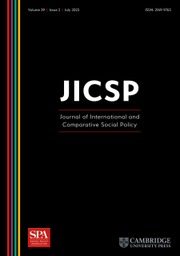Article contents
The Cold War and the welfare state in divided Korea and Germany
Published online by Cambridge University Press: 09 March 2020
Abstract
Several scholars have hypothesized that the unprecedented expansion of the welfare state during the immediate post-war decades was to some degree related to fierce regime competition in the bipolar world that emerged in the aftermath of the Second World War. This paper uses the case study method to provide a more nuanced analysis of the causal mechanisms linking the Cold War and the welfare state. Focussing on Germany and Korea, which in methodological terms can be regarded as most-likely cases, we examine whether and, if so, to what extent the Cold War rivalry has influenced national social policy development in these divided countries. We argue that two causal mechanisms, competition and demarcation, were important in this respect. Both mechanisms were closely related to the need of governments to enhance regime legitimacy in a period of military tension and political conflict.
Keywords
- Type
- Research Article
- Information
- Journal of International and Comparative Social Policy , Volume 29 , Issue 3 , October 2013 , pp. 258 - 275
- Copyright
- Copyright © 2013 Taylor & Francis
References
- 1
- Cited by


